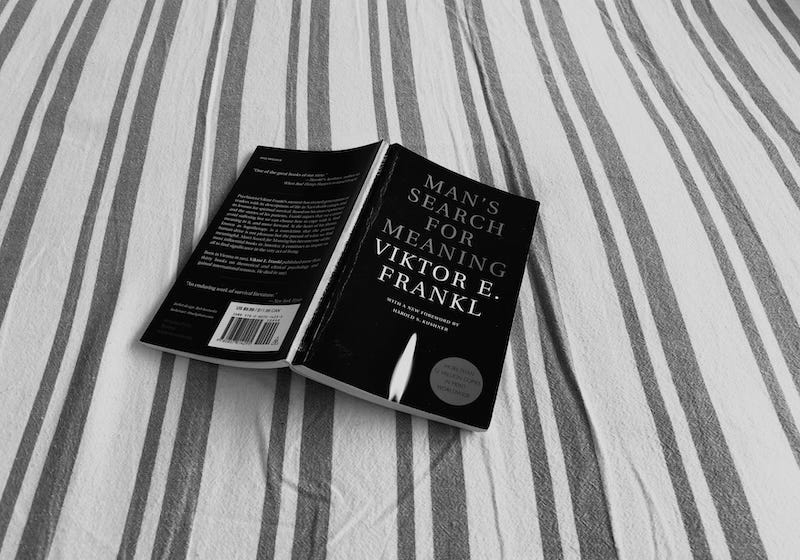As they say in celebrity speak, it’s “having a moment.”
Never before has it received this level of recognition—this month’s meditation theme [HERE]—and all of it has been universally positive.
I’m not sure if it’s geographically-related or simply something that’s happening in the culture.
Nevertheless, it’s remarkable.
I’m speaking of the fact that for the last year, during my nearly daily trips to the Foodtown supermarket that was part of our Bushwick building, never once did a clerk ever issue a single comment.
Now, however, during my thrice-weekly visit to Trader Joe’s—it’s exactly 3 minutes from my Tues/Thurs/Sat swim—about half the time, the person bagging my groceries warmly compliments my shopping bag, one which my godmother made for me many years ago.
My bag’s admirers range from twenty-something hipsters to senior citizen cashiers, conservative bro-dudes to dyed-hair art school dropouts with curated thrift store vibes.
At the risk of inciting your envy, here it is:

In this last week of exploring the theme of Recognition—although he’s never seen my bag—I want to share a modern master on the subject.
Indeed, the title of his New York Times profile last month says it all:
Disarming the World with Random Compliments
And that’s exactly what he does.
Troy Hawke (real name Milo McCabe), an Instagram sensation with over 1.3 million followers, clad in a purple smoking jacket, simply pays compliments to strangers on the street.
Miraculously, they are spontaneous and verbally dazzling.
Here’s a small sample of his witty genius:
“You’re like a plucky hero in an animal-based Disney adventure.”
“You have the poise of an apex predator,
but the eyes of a kindly woodland creature.
It’s a devastating combination.”
“Your ponytail gives you the aura of a silken, elven hero.”
”You look pensive but capable enough
to deal with anything that’s worrying you.”
“You have ski-resort owning energy.”
And finally (and please imagine that you’re just randomly walking down the street when a colorful stranger says to you):
“Sir…your voice implies a life littered with every conceivable type of formative and challenging experience, yet still your eyes twinkle with the wonder of a toddler watching a piñata’s head explode.
Never stop, never change.”

This week I was also struck by a fact I had forgotten while re-reading this month’s Transformation Book Club selection: Viktor Frankl’s classic Man’s Search for Meaning.
Published in 1946, the book was listed by both the Library of Congress and the Book-of-the-Month Club as one of “the ten most influential books in the United States.”
An Austrian psychologist, Frankl chronicles his experiences in a Nazi concentration camp, making a powerful case that being able to connect with a sense of purpose was the determining factor in who survived and who did not.
I hadn’t read it in decades, and the experience of re-reading it was quietly powerful.
Many moments I had forgotten came back, many of which were quite striking.
One detail I found particularly compelling—especially given the irony of my circumstances:
You see, I re-read the book in one day, sandwiched between incredibly challenging technical tasks for (contractually required) self-promotion.
Getting the new wireless mic to pair with its camera receiver proved a Herculean task—even setting up the tripod felt daunting.
My self-pitying lament of these being the tasks required of a writer in 2025 was cut short, however, when I read that Frankl originally intended his book—one which has sold 16 million copies and been translated in 50+ languages—be published anonymously.
In fact, rather than having his name on the cover, Frankl wanted only to list his concentration camp number.

This impulse runs so contrary to our contemporary media culture’s norms.
Indeed, a wildly successful transformation author has lately been challenged with issues of uncredited borrowing—even plagiarism.
Such misdeeds feel even more criminal given Frankl’s initial firm determination that the book should be published without even his name on the cover.
His friends persuaded him otherwise, allowing him to realize that “as an anonymous publication it would lose half its value.”
Frankl is the opposite of an exhibitionist, yet he understood that for his words to have their greatest impact, he had to allow himself to be revealed.
For his message to resonate, it was necessary, in other words, that he be properly recognized.

I really love this quirky poem by Matthew Olzmann for many reasons.
Mountain Dew Commercial Disguised as a Love Poem
So here’s what I’ve got, the reasons why our marriage
might work: Because you wear pink but write poems
about bullets and gravestones. Because you yell
at your keys when you lose them, and laugh,
loudly, at your own jokes. Because you can hold a pistol,
gut a pig. Because you memorize songs, even commercials
from thirty years back and sing them when vacuuming.
You have soft hands. Because when we moved, the contents
of what you packed were written inside the boxes.
Because you think swans are overrated and kind of stupid.
Because you drove me to the train station. You drove me
to Minneapolis. You drove me to Providence.
Because you underline everything you read, and circle
the things you think are important, and put stars next
to the things you think I should think are important,
and write notes in the margins about all the people
you’re mad at and my name almost never appears there.
Because you made that pork recipe you found
in the Frida Kahlo Cookbook. Because when you read
that essay about Rilke, you underlined the whole thing
except the part where Rilke says love means to deny the self
and to be consumed in flames. Because when the lights
are off, the curtains drawn, and an additional sheet is nailed
over the windows, you still believe someone outside
can see you. And one day five summers ago,
when you couldn’t put gas in your car, when your fridge
was so empty—not even leftovers or condiments—
there was a single twenty-ounce bottle of Mountain Dew,
which you paid for with your last damn dime
because you once overheard me say that I liked it.
Given that the poet beautifully recognizes that his love (Vievee Francis, another poet) recognizes all these things in him, I’m betting their marriage might work, too.

Troy Hawke’s has a technique for paying compliments:
“When I’m walking down the street,
I’ll put 100 percent focus on someone,
with no inner monologue, and then something will come up.”
As he admits, it’s almost a masterclass in Meisner technique, giving complete attention to another person, and then genuinely expressing whatever delightful qualities stand out.
The poet Philip Larkin famously wrote:
“We should be careful
Of each other, we should be kind
While there is still time.”
Hawke takes it further, encouraging those who want to follow his example to simply notice something authentic and specific to their subject:
“Nothing genetic. Nothing obvious.
Something they’ve spent time on or worked on.”
And without hesitation or apology, you must burst out with your genuine compliment.
As Stefano Montali reported in the New York Times, he is “a hero for the social-media age. His superpower? Creating moments of unexpected delight,” to which I would add only: through the power of recognition.

(the man himself, IG HERE)
Although I’m saddened some authors crave recognition so much that they’re willing to put their name on work that isn’t quite theirs, I’m also deeply heartened to learn that others, like Frankl, reject anonymity only because it’s not in service of their greater message.
Whether it’s noticing that someone’s spent their last damn dime on Mountain Dew, just because they overheard you liked it, or remarking that someone’s shopping bag is quite handsome, there’s something profoundly human about noticing something and then sharing it.
Indeed, we’d be wise to heed the wisdom of Mary Oliver’s poem Sometimes, advice which Troy Hawke embodies :
Instructions for living a life:
Pay attention.
Be astonished.
Tell about it.
In a world desperately hungry for meaning, a little recognition might just mean everything.

